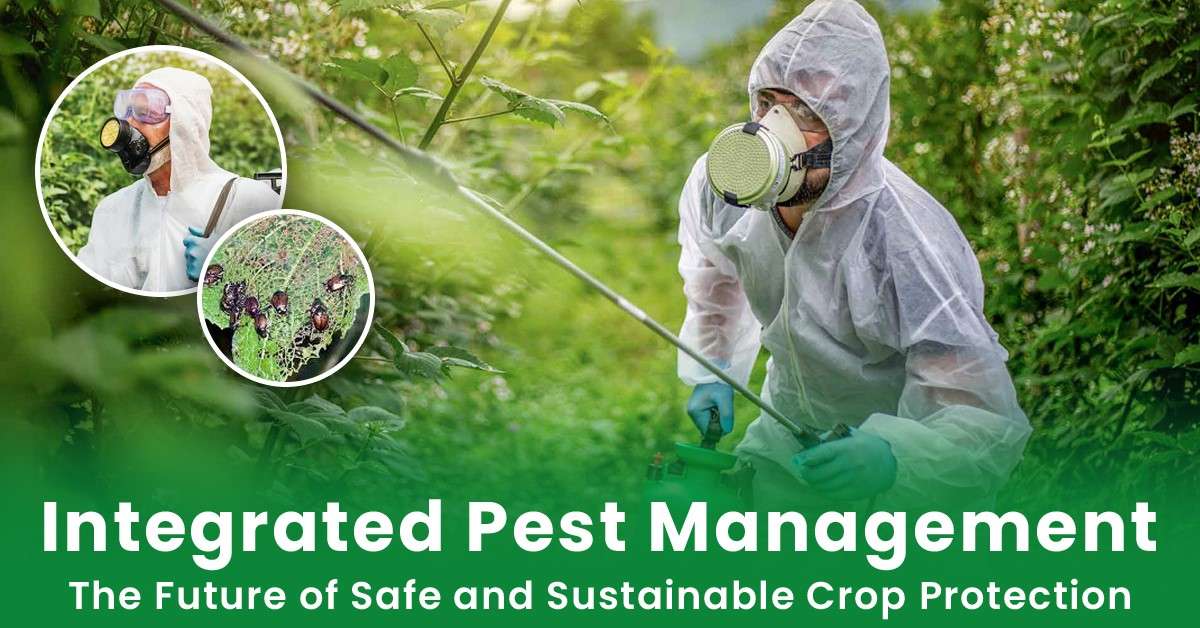In the sector of Indian agriculture, guarding crops against the merciless attacks of pests and diseases has long been quite a big challenge. Indian farmers adopt traditional approaches, and they are quite reliant on chemical pesticides that demonstrate short-term efficiency; however, this practice raises serious concerns when it is all about long-term consequences on both environmental and human health.
Integrated Pest Management (IPM) is an innovative and sustainable way to offer a holistic, environmentally-centered solution to protect crops. In this guide, we will delve into the several benefits of Integrated Pest Management for crop protection. Ultimately, it has a pivotal role in nurturing strong agricultural systems while protecting nature.
Understanding Integrated Pest Management (IPM)
Integrated Pest Management is actually a testimony to the blend of diverse strategies aimed at pest management, all the while bringing down ecological disruption and significant harm to farmers’ health.
The main functionalities of IPM are to initiate the strike of an equilibrium between pest population control and the savingof beneficial microorganisms and ecosystem balance. Such a multi-faceted method is used to integrate preventive measures, social practices, organic controls, and specific pesticide applications whenever needed.
Benefits of IPM (Integrated Pest Management)
It is possible to create a dynamic and flexible system to adapt to the evolving demands of crops and agri-ecosystems. Here are the benefits to count on:
Sustainable pest control for long-term success
The core of IPM is its persistent commitment to sustainable pest control practices. Unlike traditional methods that generally rely heavily on chemical pesticides, IPM focuses on a tiered approach to promote a cultural and biological intervention. Such techniques incorporate practices like crop rotation, companion plantation, and habitat variations that all disrupt pest lifecycles and bring down the chances of proliferation.
When you minimize the reliance on chemical inputs, IPM is the choice because it ensures effective pest management as well as the cultivation of a balanced environment which would be more reliable in facing changing conditions.
Fostering biodiversity as a natural defense mechanism
The fundamental of Integrated Pest Management is its firm dedication to biodiversity conservation. IPM attains the innate checks and balances that ecosystems contain in order to control pest populations through the encouragement of natural predators and parasitoids.
Such a proactive approach would extend crossing the boundaries of particular fields to incorporate adjacent fields and wildlife corridors. Ultimately, it promotes a thriving ecosystem of beneficial organisms. In other words, you get a self-sustaining ecosystem where pests are managed by a multitude of natural forces with a marked reduction of reliance on chemicals.
Mitigating environmental impact
The environmental inferences of traditional pesticide use are limited and often underperforming. Indian farmers buy quality pesticides to avoid contamination of water resources that otherwise badly impact aquatic life and thus potentially endanger human health. Additionally, Integrated Pest Management practices are deliberately planned to minimize all those negative externalities. By engagingin specific and judicious pesticide applications when necessary and blending them with other controlling methods, IPM can markedly reduce chemical usage and the subsequent impact on the quality of water, soil health, and air.
Cost-efficiency in the long run
Integrated Pest Management is considered to be a sound investment; however, it is worth noting that the initial transition to an IPM framework could involvea bit more investment of time and resources. This is because the long-term economic benefits are said to be resoundingly evident. As IPM systems grow, there is a tangible reduction in dependence on pricy chemicals. Hence, in the end, with IPM practices, there will be improved crop yields and quality leading to substantial financial gains. Another benefit of avoiding chemicals is that pests do not develop resistance because that makes them harder and more expensive to control – this is a common problem of relying too much on pesticides.
Safeguarding health and well-being
Farmer health and safety are extremely essential and the priority in any agricultural practice. Conventional pesticide application is likely to carry a potential risk to the health of farmers, field workers, and consumers as well. IPM avoids these concerns as it prioritizes the use of low-toxicity or non-toxic alternatives, minimizes direct exposure, and ensures the integrity of the food supply chain. Such an approach protects everyone related to agriculture and also contributes to the overall community’s health and well-being.
Tailored solutions for contextual challenges
A defining distinctive feature of IPM is its flexibility to align with components of agroecosystems. As each farming context is unique, Integrated Pest Management empowers Indian farmers to work on their strategies by keeping all challenges ranging from pests to climatic conditions in mind. Such a personalized approach would assure that interventions are accurate and effective to strike a subtle balance between ecosystem preservation and pest management.
Knowledge enrichment through a journey of discovery
The adoption of Integrated Pest Management works as a catalyst for strengthening the relationship between farmers and their fields. Embracing Integrated Pest Management (IPM) demands a deeper knowledge of ecological interaction, pest patterns, and the rudiments of agricultural systems. Such a quest for information not only empowers Indian farmers to take informed decisions but also fosters a sound sense of stewardship and responsibility towards Mother Nature.
Practice IPM to get the best crop yields
Integrated Pest Management serves as a beacon of hope in the quest for sustainable agriculture in India. By harmonizing nature’s wisdom with human ingenuity, it offers a holistic solution to crop protection that prioritizes environmental stewardship, biodiversity conservation, and long-term resilience.
As global challenges related to food security, climate change, and environmental degradation loom large, the adoption of IPM emerges as a vital step towards building a future where both people and the planet thrive. By embracing the principles of Integrated Pest Management, farmers can pave the way for a more secure, balanced, and sustainable agricultural landscape that nourishes generations to come. Agriculturists and top africulture marketplaces such as BadiKheti also insist that Indian farmers should adopt agritech to refine the farming practices that only help them in saving crops from pests and diseases but also earn them the best yields and thus earn good profits in the agricultural marketplace.









